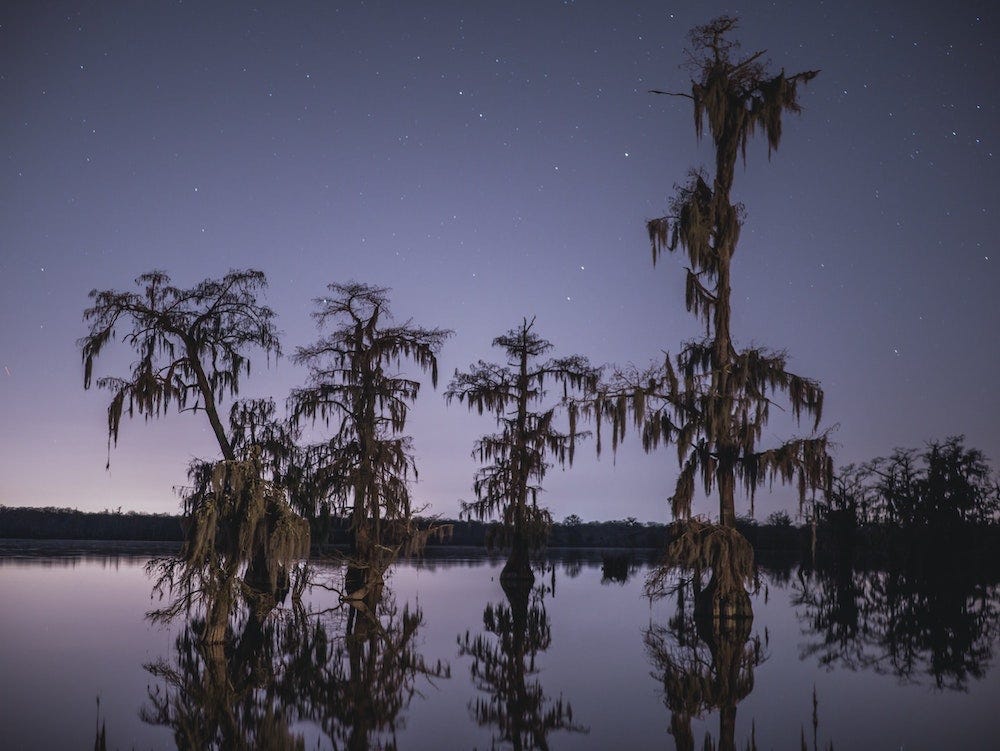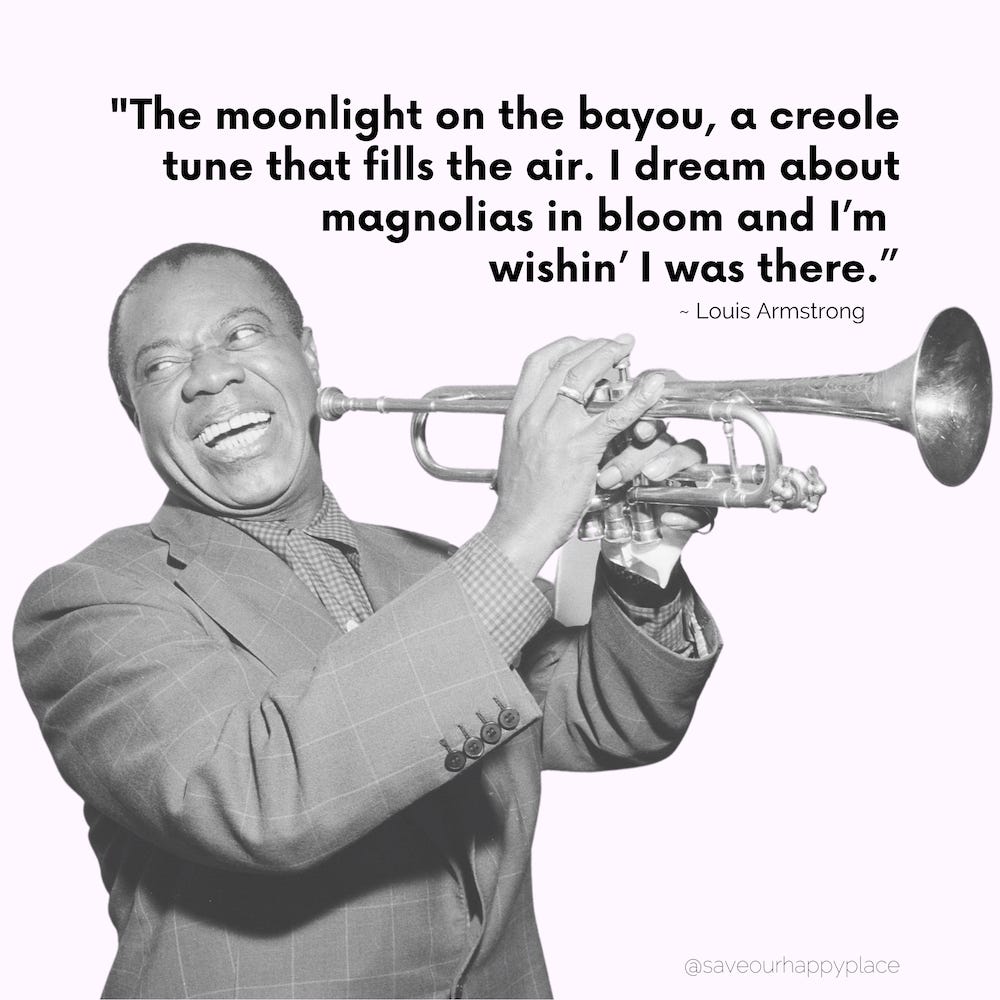Down in New Orleans
Exploring the climate crisis in Louisiana, what Mardi Gras can help the climate movement remember and how you can help ensure a just transition for the Gulf South.
Happy Mardi Gras Mon Cheri! Welcome to Save Our Happy Place, a newsletter making it easy for you to help protect the places you love from climate change. Today is Mardi Gras down in New Orleans, my hometown, and OG happy place. So this week's edition of Save Our Happy Place is in dedication to all things Louisiana (La.). Because my beloved La. was built below sea level, it is in an even more precarious predicament when it comes to climate change.
So be sure to check out ways to support efforts to help save my happy place and one of America's cultural hubs, diverse ecosystems, culinary meccas, and favorite vacation destinations.
What is Mardi Gras?
And what can it help the climate movement remember
In the most simple of terms, Mardi Gras is a late winter carnival dating back thousands of years with a reputation for being quite the raucous occasion. But it is so much more than the stereotypical extravagant revelry, beautiful costumes, and flamboyant parades. In its most pure form, Mardi Gras is a celebration of life and culture, observed by people who know hardship, who have seen our potential collective future within the climate crisis, and choose to find joie de vivre anyway. Mardi Gras is a magnificent reminder that even in the darkest times (pandemics, war, natural disasters, and economic stressors) life is still worth celebrating, there is still beauty to be admired and good times to be had. It is not an attempt to ignore or to distract, but to embrace life wholeheartedly.
Mardi Gras is for everyone. People of all ages, ethnicities and economic statuses find joy within the festivities, for it is not a specific moment, cuisine, or event but a way of life. Parades are not sponsored by mega-corporations such as Coca-Cola, they are thrown by the people for the people.
The Climate Crisis in Louisiana

In 2005 the year Hurricane Katrina hit, at that time, the media’s narrative around hurricanes in the gulf was not being directly linked to global warming. But, as any good Gulf Coast kid knows, warmer waters cause mightier hurricanes. So that fear of what will the future hold for my home within a changing climate has weighed on my mind and heart for the last 17 years.
As a high schooler during Hurricane Katrina, I spent part of that school year 900 miles away from home with kids who couldn’t even place La. on a map. I was asked time and time again, “Why bother going back?” This same sentiment panged throughout my entire adult life after each fresh hurricane or oil spill in the gulf: “Why rebuild?“ “Why bother?” “People shouldn’t be living there in the first place.” Hearing individuals not yet affected by the climate crisis harpooning the idea that it is better to throw away an entire city and its history, people, homes and culture than to make the changes needed to combat the climate crisis felt immensely isolating.
These terrorizing statements only just recently stopped coming when it became increasingly evident that we all stand to suffer the effects of the climate crisis globally. For instance, the NOAA has recently reported that in addition to an estimated 2ft in La., all U.S. coastlines are likely to see up to a foot of sea-level rise by 2050. Simply put, while La.’s label as a place of coastal risk,has long been confirmed, its situation is not unique and can be looked at as more of leading indictator of a greater trend.
What’s Stacked Against La?

La. and the oil and gas industry have an “It’s Complicated“ relationship status. The extracting and burning of fossil fuels contributes directly to the climate crisis, resulting in the warming and rising of oceans. These changes to the environment perpetuate problems for La. like more costly and expensive hurricane recovery, the loss of football field of coastline per hour, and an increased risk of flooding.
Why Louisiana Should Break Up With Oil & Gas
26% of the State’s GDP in 2019 came from the oil and gas industry. This reliance on a declining industry has heralded further economic struggles for the state. Further complicating things, La. ranks in the top three states in the US for total energy consumption because of its energy-intensive oil & gas industry. To top it all off, between 300 and 700 barrels of oil per day have been spewing from a site 12 miles off the La. coast since 2004, ruining surrounding ecosystems and local fishing economies.
Even our beloved Mardi Gras is tied up in the petroleum industry through the production of plastic beads, which causes further detriment to the environment. Every year millions of pounds of Mardi Gras beads are thrown during parades. Made in China, the beads have so many toxic chemicals they are not legally allowed to be shipped through California. These beads end up in landfills, storm drains, and coastal fisheries. The carbon footprint of shipping these beads alone is enough to give you pause.
Gearing Up For Change

“Hurricane. Flood. Oil spill. Poverty. Whatever the world bring, we don’t care. We stay. We won’t bow down.” - Mardi Graws Indian from the Creole Hard Headers tribe.
La. is poised for a transition to renewable energy and any fears associated with this change and how it might impact the local job market are largely inflated. At present, only 1.5% of the La. labor force works in oil and gas (and an even smaller percentage of those workers work in physical oil extraction). Meaning the retraining of less than 1.5% of the labor force from oil extraction to wind and solar installation is completely reasonable and already happening. La. is already in the running to host the world’s biggest offshore wind developers.
Additionally, on both a state and city level, there are widely supported plans to reach net-zero emissions by 2050, the first plans seen in the Gulf South.

Organizations like Verdi Gras and Grounds Krewe are working to make Mardi Gras more sustainable and further stimulate the local economy without sacrificing tradition by creating better recycling pick up during parades and more eco-friendly throws. Mardi Gras parade krewes have also been transitioning to throwing more useful objects and recyclable material.
A Call to Celebrate and Support Louisiana
Support a Just Transition for the Gulf South
Why? La. ranks in the top 5 in the U.S. for income inequality. Black and brown communities are often in the line of danger during environmental safety rollbacks and the building of new petroleum projects.
How? Look into supporting one of the below organizations.
Support Better Waste Diversions in New Orleans
Why? La.’s recycling programs are lagging and far below average.
How? Look into supporting one of the below organizations.
Other Local Climate Activism Organizations to Support
Meet Lindsay Nunez, SOHP Founder
Happy Place: New Orleans
Once a month, we will dive into the happy place of one of our SOHP community members and introduce them to you. So as the founder, I’m going to kick things off.
Some Rays of Sunshine
Laissez Les Bonnes Nouvelles Rouler (let the good news roll!)

Grant to a local news outlet expands environmental reporting. - Read More
La. received millions to plug hundreds of 'orphan' oil & gas wells. - Read More
Climate task force approves state greenhouse gas reduction plan. - Read More
Offshore wind farms in the Gulf of Mexico could create 17,500 jobs. - Read More
NOLA City Hall to switch green vehicles by 2025. - Read More
La. will spend $1.28B on hurricane protection & coastal restoration in 2023. - Read More
Army corp of engineers to create more levee systems. - Read More
Magnify Your Impact
Share the Save Our Happy Place Newsletter with a friend.
Support Save Our Happy Place
If you enjoy making waves against climate change with us, please consider supporting our efforts by donating through Patreon.
Volunteer with Us
If you would like to contribute to Save Our Happy Place or volunteer your time & skill set, please let us know.









